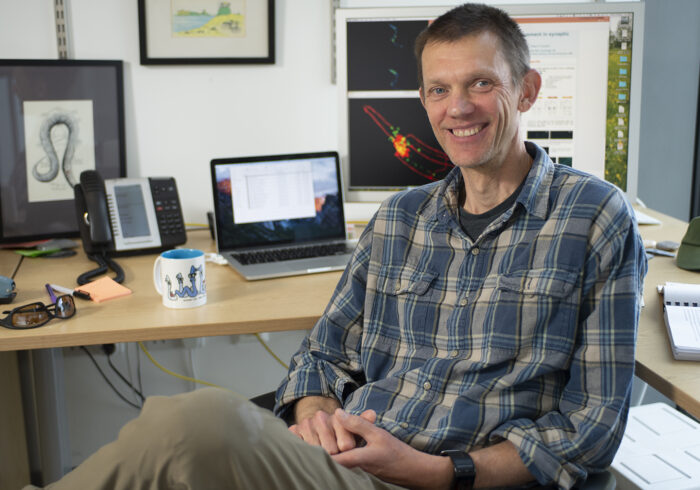This year’s Royal Society fellows include LMB group leader William Schafer and alumna Sarah Teichmann

William Schafer, group leader in the LMB’s Neurobiology Division, has been elected as a Fellow of the Royal Society. The Royal Society is a Fellowship of the world’s most eminent scientists and is the oldest scientific academy in continuous existence.
“I am incredibly grateful to all the postdocs, students and other lab members who contributed to the work honoured by this fellowship. I would particularly like to mention Dr Denise Walker who has been my lab manager at the LMB for almost 13 years,” said Bill about his election.
Bill, a neuroscientist, first came to the LMB in 2004 on a sabbatical visit. Later on, in 2006 he moved to the LMB as a Programme Leader. His work has investigated conserved principles by which neurons and neural circuits control behaviour. By studying C. elegans nematode worms with simple and well-characterised nervous systems, he has addressed basic questions in neurobiology, including how sensory neurons detect environmental stimuli, how neuromodulators control behavioural states, and how patterns of neuronal wiring relate to brain function. In the course of this work he has also introduced new methods for detecting and recording the activities of neurons in living animals and for quantitatively defining the effects of genetic mutations on behaviour; these approaches have become widely applied throughout neuroscience.
He obtained his PhD in Biochemistry from the University of California, Berkeley and began work on nematode neurobiology as a postdoctoral researcher at University of California, San Francisco. He was a faculty member in the Biology Division at University of California, San Diego, before moving to the LMB in 2006. He is also a member of EMBO (2009) and a Fellow of the Academy of Medical Sciences (2018).
Sarah Teichmann, currently Cellular Genetics Programme Head, Wellcome Sanger Institute, and an LMB alumna, has also been elected as a Royal Society Fellow. Sarah was a PhD student in the Structural Studies Division from 1996 to 1999, and then a Group Leader from 2001 to 2013. She is interested in global principles of protein interactions and gene expression. In particular, her research now focuses on genomics and immunity.
On the occasion, Venki Ramakrishnan, President of the Royal Society, and group leader in the LMB’s Structural Studies Division, said, “At this time of global crisis, the importance of scientific thinking, and the medicines, technologies and insights it delivers, has never been clearer. Our Fellows and Foreign Members are central to the mission of the Royal Society, to use science for the benefit of humanity. This year’s Fellows and Foreign Members have helped shape the 21st century through their work at the cutting-edge of fields from human genomics, to climate science and machine learning. It gives me great pleasure to celebrate these achievements, and those yet to come, and welcome them into the ranks of the Royal Society.”
More than 60 exceptional scientists from around the world have been elected as Fellows and Foreign Members of the Royal Society. The 51 new Fellows, 10 Foreign Members and one Honorary Fellow have been selected for their outstanding contributions to scientific understanding. With discoveries ranging from the first planets outside our solar system, to the creation of the world’s smallest molecular engine, new mathematical proofs and treatments for debilitating global disease. They embody the global nature of science, with representation from Sweden, Israel, Germany, Australia, Canada, UK-born scientists working in Europe and beyond, and researchers from around the world enriching Britain’s own research and innovation sector. Their ranks include six Nobel laureates, as well as internationally recognised leaders in industry and science policy.